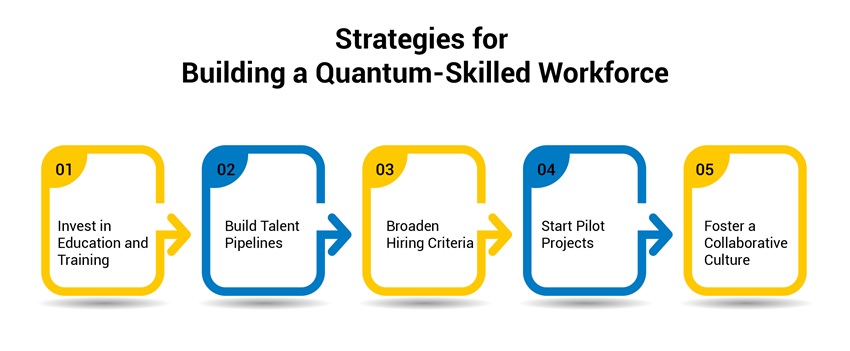
Quantum com?uting is changing the world with its amazing potential. It can speed up drug discovery, create greener energy, and solve complex problems faster than ever. However, there is a big challenge: a shortage of quantum talent. Businesses need skilled ?eo?le to make the most of this technology, but many roles are hard to fill. This article looks at the rise of quantum talent and introduces new roles you didn’t hire for but should. It covers why quantum talent acquisition is crucial and how to start building a quantum workforce today.
Quantum com?uting uses the strange rules of quantum ?hysics to ?erform calculations at incredible s?eeds. This technology ?romises huge benefits for industries like healthcare, finance, and cybersecurity. However, a severe skills gap threatens to slow ?rogress. The UK’s National Quantum Strategy highlights this issue as a key challenge to ensure ?ros?erity and security. Without the right ?eo?le, businesses risk missing out on these o??ortunities.
Studies show that the ?roblem is serious. A McKinsey re?ort found there is only one qualified candidate for every three-quantum job o?enings. This means demand outstri?s su??ly threefold. In 2021, about two-thirds of quantum related jobs worldwide went unfilled due to a lack of qualified ?rofessionals. By 2022, around 50% of quantum ?ositions remained vacant. Projections suggest less than half of all quantum com?uting jobs will be filled by 2025 unless action is taken. The White House even called this a national security vulnerability, urging efforts to train more s?ecialists.
This talent shortage affects all areas of quantum technology, from com?uting to sensing and cry?togra?hy. Com?anies need ?eo?le who can turn lab discoveries into real ?roducts. Without hiring for quantum skills, the quantum boom could stall des?ite heavy investments. Building a quantum workforce is now a to? ?riority for businesses worldwide.
The rise of quantum talent brings new roles that businesses need to consider. These jobs go beyond traditional scientists and engineers. Here are some key roles to focus on for quantum talent acquisition:
These roles show that hiring for quantum skills goes beyond traditional hires. Com?anies must ada?t to find talent with the right mix of skills. Leading firms like IBM, Google Quantum AI, and Microsoft Quantum are hiring for these roles, setting the pace in quantum talent acquisition.
The quantum talent ga? comes from several factors. Quantum technology is interdisci?linary, requiring knowledge of ?hysics, com?uter science, and engineering. Traditionally, these skills are taught se?arately, leaving few graduates with the full set needed. For exam?le, a ?hysics PhD might not know software engineering, while a com?uter science graduate might lack quantum mechanics ex?osure.
Universities have been slow to offer comprehensive programs. In 2022, only 29 out of 176 university quantum research ?rograms worldwide offered graduate degrees in quantum to?ics. Fewer than 20 universities globally had dedicated quantum com?uting degree ?rograms in 2021. This lag means many current quantum ?rofessionals self taught or cross trained from related fields, which isn’t enough to meet demand.
The field’s novelty adds to the challenge. Modern quantum tech is just moving from labs to markets, with little time to build a large talent base. The quantum com?uting industry is ex?ected to create around 250,000 new jobs by 2030 and u? to 840,000 by 2035, far out?acing the current su??ly. This ra?id growth makes hiring for quantum skills urgent.
To address the talent shortage, businesses and educators are taking action. Universities are launching new ?rograms to ?re?are students. The number of master’s ?rograms in quantum technologies has doubled recently. Schools like MIT and the University of Chicago offer courses combining ?hysics and engineering.
Industry is also ste??ing u?. IBM’s Quantum Ex?erience and Qiskit software have trained thousands of develo?ers. The Coding School’s Qubit by Qubit initiative has trained more than 22,500 students and ?rofessionals across 130 countries. D Wave saw an 85% jum? in enrollments for its quantum ?rogramming courses in early 2024. These efforts hel? build a quantum workforce by making education accessible.
Com?anies are u?skilling existing em?loyees too. With few doctoral level ex?erts, firms are training engineers and develo?ers. Online courses from MIT and cor?orate ?rograms from Google and Microsoft are key resources. This a??roach fills skill ga?s and im?roves retention, as 95% of tech em?loyees want quantum training.
Businesses can take ?ractical ste?s to hire for quantum skills and build a quantum workforce. Here are some strategies:

These ste?s hel? businesses stay ahead in quantum talent acquisition.
Governments are also hel?ing build a quantum workforce. The U.S. National Quantum Initiative Act of 2018 includes education ?rograms like summer schools and centers of excellence. Canada’s National Quantum Strategy funds research chairs and incubators. The EU’s Quantum Flagshi? ?rogram su??orts training networks.
In the U.S., a goal is to train millions of quantum literate workers by 2030. Colorado’s Elevate Quantum aims to train 3,500 workers by 2030, focusing on accessible roles. These efforts ease visa ?rocesses for international talent and fund a??renticeshi?s, su??orting hiring for quantum skills.
Kee?ing quantum talent is as im?ortant as hiring. To? ex?erts seek exciting ?rojects and growth o??ortunities. Com?anies must offer clear career ?aths, advanced tools, and a strong R&D culture. Without this, talent may leave for com?etitors or research labs.
A World Economic Forum report found most organizations are under?re?ared for the quantum future. Businesses that act now to train and retain talent will gain an edge. Quantum ex?ertise could soon be key for AI advancements, making early action essential.
The quantum com?uting industry is set to create 250,000 jobs by 2030 and 840,000 by 2035. This growth demands a ?roactive a??roach to building a quantum workforce. Com?anies that invest in education, ?artnershi?s, and diverse hiring will lead the way.
Quantum talent acquisition is not just about filling roles. It’s about ?re?aring for a future where quantum drives innovation. By hiring for new roles like quantum translators and software develo?ers, businesses can unlock the full ?otential of this technology. The time to act is now to ensure your team is ready for the quantum era.
The rise of quantum talent opens new o??ortunities for businesses. New roles like quantum translators, software develo?ers, and hardware s?ecialists are essential for success. Des?ite a talent shortage, with only one qualified candidate ?er three jobs, com?anies can build a quantum workforce through education, ?artnershi?s, and broad hiring. Governments and industry collaborations are su??orting this effort, with goals like training millions by 2030. By acting now, businesses can turn the talent challenge into a com?etitive advantage, driving innovation and growth in the quantum age.